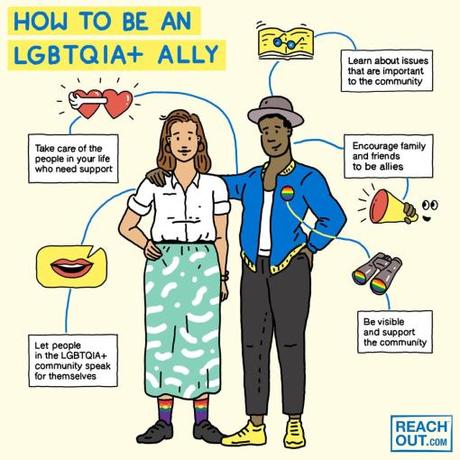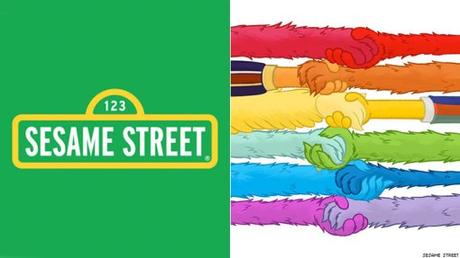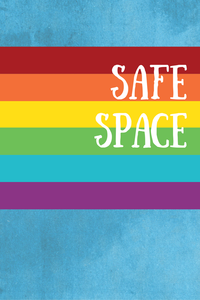 (Originally posted by Kathryn Venning on the GEL.blog)
(Originally posted by Kathryn Venning on the GEL.blog)
Happy Pride Month to the beautiful Queers of the scientific community, and beyond!
I decided to write this post to help non-queer scientists interact respectfully with their queer colleagues. When I was researching for this post, I noted very little in the way of written material on queer issues specific to the sciences, or indeed, many statistics. It’s for this reason I decided to provide you with this little primer.
Before we begin, I would like to clarify some language used below and in the queer community.
The letters: LGBTQIA+
You have probably seen varying combinations of the letters, the most common is LGBT, and the most modern and inclusive is LGBTQIA+. So, as someone who grew up watching Sesame Street, let us pay homage to my childhood.
L is for Lesbian
G is for Gay
B is for Bisexual
T is for Transgender
Q is for Queer
I is for Intersex
A is for Asexual
+ is for anyone in-between, a combination of some, variants of others, or still working it out
How I identify
I identify as a woman and my pronouns are, she/her/hers, and I am never offended by they/them/their pronouns.
I am openly bisexual; however, I personally prefer the term queer because it is inclusive, without having to state explicitly with which letter(s) in the LGBTQIA+ initialism I best identify.
What is an ally?
An ally is simply a non-queer person who is prepared to support queer people personally, socially, and/or politically.
Okay, now with the Qs acknowledged and the pronouns confirmed, let’s talk about ally-ship.
So, how does one become a good ally? What should and shouldn’t you do? Unfortunately, there is no blanket rule for good ally-ship because — and get this — each queer person is an individual with different thoughts and feelings! It’s always therefore best to ask, especially person-specific questions.

But here are some good rules of thumb (in my opinion):
Listen and respect pronouns
As with any experience you haven’t lived through yourself, listen to what people with the specific experience have to say, especially if you have asked a question. Put aside your own opinions for the conversation and listen to what the person is saying, what they have experienced, and where they think that improvements can be made.
Additionally, if someone has indicated her/his/their preferred pronouns (she/her/they/them/he/him), even if the pronouns are different from how they once identified, you must respect their chosen pronouns. It’s okay to stumble here and there — queer people are understanding if you are making a genuine effort. If you are unsure of someone’s pronouns just ask, preferably in private.
Personal questions are still personal questions
As mentioned above, unless you are sharing pubic regions with someone, the activity involving said regions is really none of your business. This includes asking about the presence or absence of genitalia.
Being bi, I am asked frequently asked by the less-delicate who I prefer; would I date one gender over the others; and my most hated, IF YOU DATE A MAN ARE YOU STILL BI? (yes).

These are extremely personal and uncomfortable questions for me to answer, even if they are asked out of pure curiosity. It also makes me feel as if I am defending my position in the queer community, and as I have said, it is none of your business. A simple way to self-regulate is to ask yourself, would I ask this of a straight-cis person? Would I feel comfortable answering this question personally? Am I in a position where I will be in personal contact with their fun-zone? If the answer is no, then don’t ask.
Tokenism
Although I am queer, I am not ONLY queer. That is, I have the lived experience of a queer person — albeit a very privileged queer experience — but I have life experience outside of being queer and have more to offer, AS WELL AS being queer. I am also a scientist, a phenomenal cook (just ask me), the unofficial comedian of my lab, dog-parent, perfect executor of the reverse parallel park. The list goes on.
Remember this when talking to queer people: although they have information to share on queer issues and should be listened to, they should also be respected and listened to outside of conversations regarding LGBTQIA+ issues. Be aware of tokenism.
Safety

A small but mighty gesture that always makes me feel warm and fuzzy inside it seeing a pride or ally-flag in a workplace.
Kathryn Venning
I acknowledge the traditional custodians of the land I work on, the Kaurna people, and pay my respects to their Elders, past, present, and emerging.

